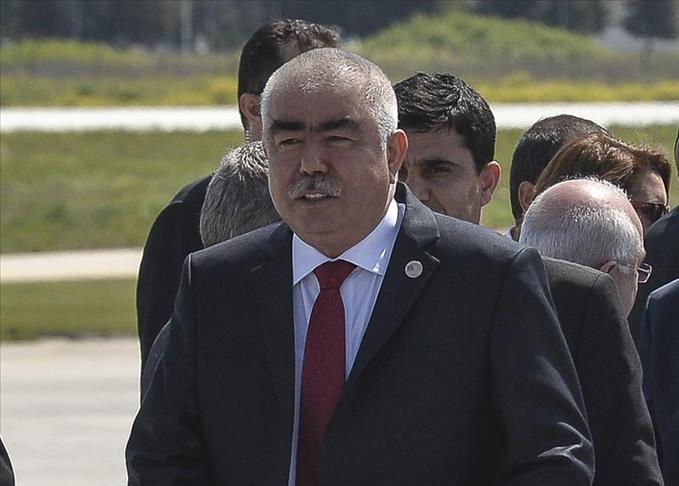
By Shadi Khan Saif
KABUL
General Abdul Rashid Dostum may have become Afghanistan's vice president since September 2014 but he has returned to his military roots.
Dostum is harnessing his reputation as a fierce military commander, earned through decades of civil war, to take charge of a full-blown military operation in the country's northwest.
Following a surge of militancy in northeastern Badakhshan and Kunduz provinces, the insurgency has also swollen in the Uzbek heartland in the northwest, where on Wednesday a suicide bomber claimed 21 lives in Faryab province.
Dostum's spokesman Inayatullah Babar Farahmand told Anadolu Agency that the General has left Kabul for his home province of Jawzjan, which neighbors Faryab, to ensure better coordination among the various pro-government forces taking on the militants.
The 61-year-old's almost unbreakable control over the Uzkbek-Turkmen heartland, and his propensity to switch allegiances at pivotal moments, have ensured him an almost constant position of power and influence through more than 30 years of unrest and civil war.
Dostum had however in recent years complained of being sidelined by the previous President Hamid Karzai, and that this allowed armed groups to intrude into the northwest.
“Uzbek and Turkmen and extremists from within Afghanistan and neighboring Uzbekistan and China made it back to the northwest when Dostum got politically isolated,” said political analyst Ferdos Kawesh.
Fighters from the Islamic Movement of Uzbekistan were believed to have the liberty to roam at will under the Taliban regime, but were mainly forced into neighboring Pakistan's restive tribal area after the U.S. invasion toppled the Taliban.
Kawesh said U.S. drone strikes and the Pakistan army's year-long anti-militant operation has forced many of the Uzbek fighters back to Afghanistan, where they have concentrated on the country's north with an eye on ultimately moving back into the energy-rich Central Asian states.
He added that significant parts of Faryab, Jawzjan and the Sar-e Pol provinces were under the control of the Taliban and their Uzbek allies, but that having Dostum in charge of the operation could just work for the Kabul government.
Dostum's spokesman Farahmand also claimed President Ashraf Ghani and the National Security Council have full trust in the veteran commander to root out the growing militancy from the north.
“The new government under President Ghani and Chief Executive Abdullah have introduced a new and positive trend of removing the distance between the brave soldiers on the front and the higher-ups in the fortified palace,” he said, referring to Ghani and his power sharing partner Abdullah Abdullah’s frequent visits to soldiers in militancy-hit provinces.
“Similarly, they have acknowledged the importance of Vice President Gen. Abdul Rasheed Dostum in ensuring peace in the north,” said Farahmand.
But there is also concern about Dostum, with some worried that giving him the chance to accumulate his own military strength parallel to the state could backfire. He was among many of the country's warlords heavily criticized by human rights groups for alleged abuses committed by his Junbish militia.
In the 2001 Dasht-i-Leili massacre alone, the warlord was blamed for killing several hundred Taliban prisoners.
Afghan security analyst Abdul Ghafoor Gardezi cautiously welcomed Dostum's direct involvement in the Afghan north’s security affairs but warned that after clearing the area of militants the operation should not be allowed to become a chance to use local militias for political gain.
With many Afghan warlords remaining in control of armed militias and sometimes sizeable arsenals of weapon, Gardezi said he was confident Ghani and Abdullah would not compromise the country's security by conceding more power to militias that push the Taliban out of the north.
Dostum has prepared to take charge of those forces after last month declaring, alongside the powerful Acting Governor of northern Balkh province, that they wanted to send a strong message to anti-government forces.
“Unlike Badakhshan and Kundz provinces where the extremists killed and even beheaded the Afghan soldiers, we will root out them from the north swiftly, God willing,” said his aide Farahmand.
Anadolu Agency website contains only a portion of the news stories offered to subscribers in the AA News Broadcasting System (HAS), and in summarized form. Please contact us for subscription options.

